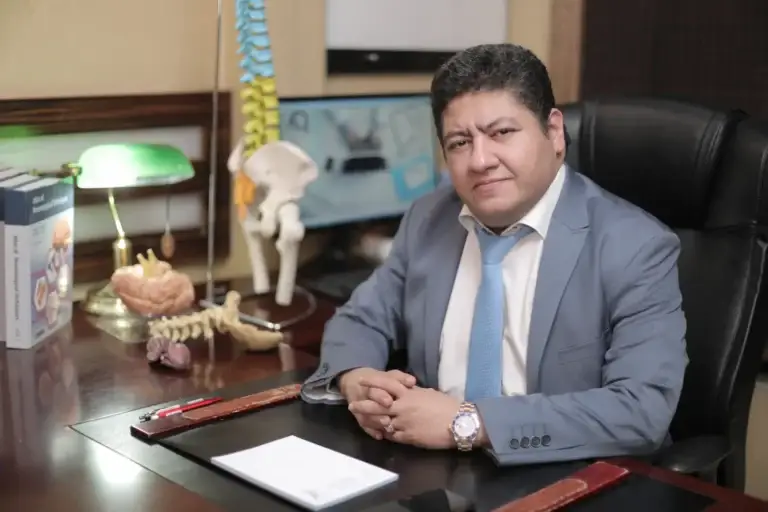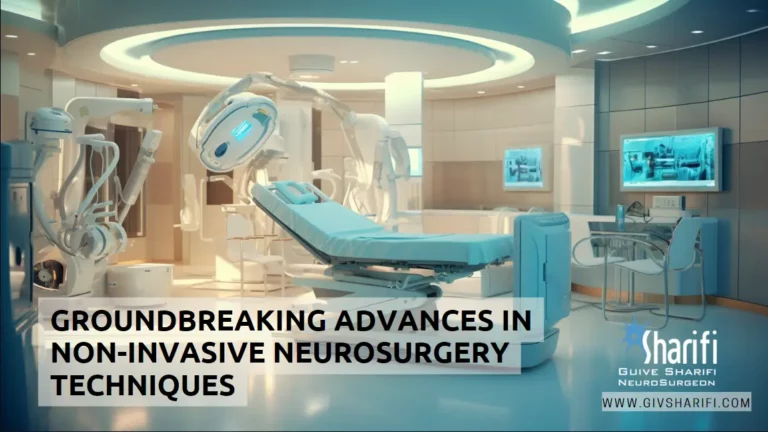Advanced Endoscopic Pituitary Surgery for Precise Treatment
Minimally invasive procedures to address pituitary disorders with optimal patient care
|
What is the pituitary Gland?
Your pituitary gland is a small, pea-sized endocrine gland located at the base of your brain below your hypothalamus. It releases several essential hormones and controls the function of many other endocrine system glands.
|
What is the function of the pituitary gland?
The primary function of your pituitary gland is to produce and release several hormones that help carry out essential bodily functions, including:
- Metabolism (how your body transforms and manages the energy from the food you eat).
- Response to stress or trauma.
- Water and sodium (salt) balance.
- Labor and childbirth.

|
What conditions and disorders are related to the pituitary gland?
Several conditions can affect or are affected by your pituitary gland’s function. The four main categories of issues related to your pituitary gland include:
- Pituitary adenomas
- Hypopituitarism
- Hyperpituitarism
- Empty sella syndrome
|
Pituitary adenomas
A pituitary adenoma is a benign (noncancerous) growth on your pituitary gland. They make up 10% to 15% of all tumors that develop within your skull.
Pituitary adenomas usually grow slowly, but if they grow too big, they can put pressure on nearby structures and cause symptoms. They can also compress your optic nerve and lead to vision disturbances (loss of peripheral vision). In rare cases, large pituitary adenomas can bleed internally.
They included two main categories:
Functional
Some pituitary adenomas release excess pituitary hormones. These are called functioning (secreting) adenomas, such as Prolactinoma, Acromegaly, Cushing, and so on.
Non-Functional
Others don’t release any hormones. These are called non-functioning adenomas.
|
What are the symptoms of pituitary gland problems?
- Vision problems (loss of peripheral vision)
- Headaches
- Hormonal imbalances from pituitary hormone excess or deficiency
Pituitary hormone imbalances can cause many different symptoms depending on which hormone is affected, including:
- A lack of growth or excess growth in children
- Male and female infertility
- Irregular periods
- Unexplained weight gain or weight loss
- Depression and/or anxiety
- Hirsutism
|
Diagnosis
It’s important to talk to your healthcare provider any time you experience new, persistent symptoms. They can order simple blood tests to determine whether your symptoms are related to hormone issues or something else.
If you have irregular hormone levels, your provider may order imaging tests, such as a CT or MRI scan, to evaluate your pituitary gland for any issues. Typically, providers order a dedicated pituitary MRI to see your pituitary gland and stalk more clearly.
|
Treatment
Surgery is the primary treatment for many pituitary tumors. How the surgery is done (and how well it works) depends on several factors, including the type of tumor, its size, and location, and if it has spread into nearby structures.
- Endoscopic Transsphenoidal surgery
This is the most common way to remove pituitary tumors. Transsphenoidal surgery is done through the sphenoid sinus, a hollow space in the skull behind the nasal passages and below the brain. The back wall of the sinus is just below the pituitary gland.
More and more, this surgery is done by a team of surgeons that includes a neurosurgeon and an otolaryngologist (ENT surgeon)
- Craniotomy
If the pituitary tumor is more significant or more complicated, a craniotomy may be needed. This surgery is done through an opening in the front of the skull, off to one side. The surgeon must work carefully beneath and between the lobes of the brain to reach the tumor.
A craniotomy has a higher chance of brain injury and other side effects than transsphenoidal surgery for small tumors, but it’s safer for large and complex tumors because the surgeon is better able to see and reach the tumor as well as nearby nerves and blood vessels.
*For more information, some cases need a combination of both types of surgeries.
|
Who’s the best surgeon for Pituitary adenoma in Iran and UAE?
A wide range of experience is definitely mandatory for this kind of surgery and diagnosis.
Prof. Giv Sharifi is a well-known neurosurgeon in Pituitary adenoma and skull base surgery who has performed more than 28,000 successful cases in this region in more than twenty years.
Schedule a Consultation Today
If you’re facing a brain tumor diagnosis, we understand the importance of getting the best possible care. Contact us today to schedule a consultation with Dr. Sharifi and discuss your treatment options.
|
Meet Our Renowned Neurosurgeon

Dr. Giv Sharifi is a leading IRAN and Dubai-based neurosurgeon with over 20 years of experience and a DHA license. He is highly skilled in a wide range of brain tumor surgeries and other complex neurological procedures. Dr. Sharifi is passionate about patient care and achieving the best possible outcomes for his patients.
|
Considering Treatment Abroad? Explore the Benefits of Spinal Surgery in Iran
Iran has emerged as a leading destination for medical tourism, offering high-quality spinal surgery at competitive prices.
Dr. Sharifi, with his extensive experience in Iran and his international reputation, is available for consultations and surgeries at select hospitals in Tehran, offering patients the opportunity to benefit from his expertise while enjoying the advantages of Iran’s medical tourism industry.
These hospitals boast experienced surgeons, state-of-the-art facilities, and a focus on personalized care, providing an attractive alternative for those seeking affordable and effective treatment options.
Our brain tumor surgery program is performed at one of Dubai’s most prestigious hospitals, renowned for its advanced technology and VIP services. This ensures you receive the highest quality care in a comfortable and supportive environment.
FREE CONSULTATION
Innovative endoscopic techniques
Our team utilizes the latest endoscopic methods for precise pituitary surgery, reducing risks and complications.
Minimally invasive approach
Endoscopic pituitary surgery allows for smaller incisions and faster recovery times compared to traditional methods.
Comprehensive care
From diagnosis to post-operative care, our team provides support throughout the entire treatment process.
Expertise in pituitary disorders
Our neurosurgeons have extensive experience in treating a wide range of pituitary conditions, ensuring optimal patient outcomes.
Our Patients
Don’t just take our word for it
Schedule a Consultation
Take the first step towards better brain health by scheduling a consultation with our experienced team. We’ll help you understand your options and create a personalized treatment plan tailored to your unique needs.
|
Related Blog Posts
There are 6 fully trained consultant neurosurgeons with experience within 5 to 15 years working and professor Giv Sharifi’s collaboration, treating nearly 200 neurosurgical cases monthly.

Groundbreaking Advances in Non-Invasive Neurosurgery Techniques
Learn about the latest breakthroughs in non-invasive neurosurgery for safer,

The Potential and Promise of Minimally Invasive Neurosurgery: Changing Lives One Operation at a Time
Explore how minimally invasive neurosurgery is transforming patient care with faster recovery and fewer complications.

Revolutionizing the Future of Neurosurgery
Learn how AI and robotics are revolutionizing neurosurgery, enabling safer, more precise, and minimally invasive procedures.
